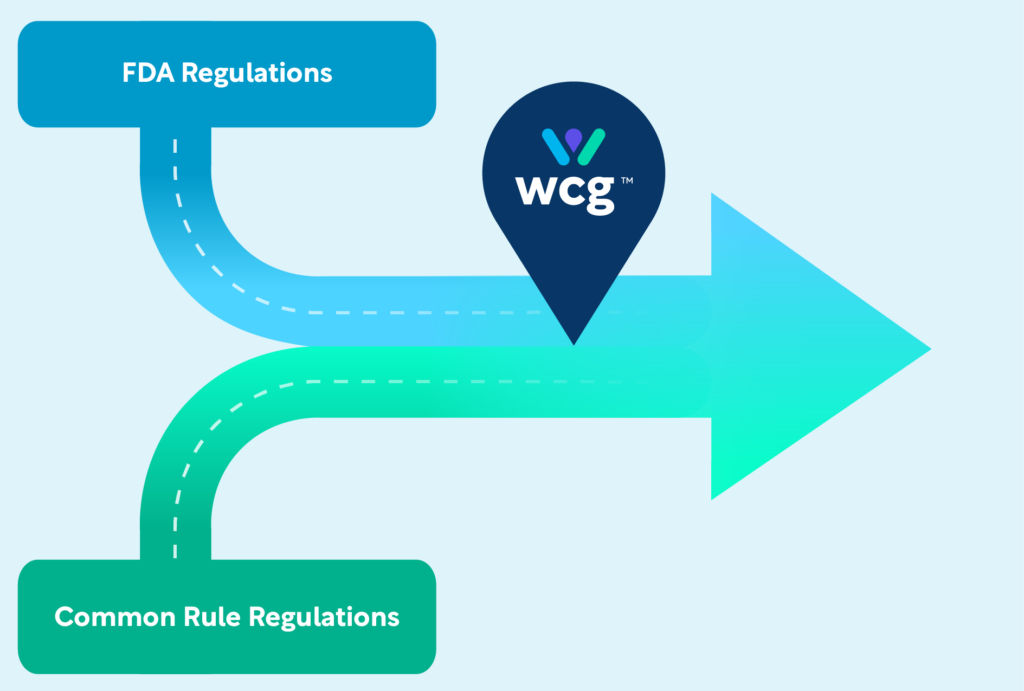
Building Partnerships Toward Single IRB
On September 28, 2022, FDA published a proposed rule that if implemented would require any institution located in the United States to rely on review and approval of a single IRB for FDA-regulated cooperative research1. If the proposed rule is implemented, having smooth processes for managing reliance agreements will become more important than ever. At WCG, we value our relationships with institutions, and recognize the difficulty in managing multiple IRB reliance agreements whether WCG is acting as a central or local IRB. SMART IRB is an NIH-funded initiative to facilitate IRB reliance agreements for multi-site studies2. WCG has been a signatory to versions 1 and 2 of the SMART IRB agreement. WCG’s experience with SMART IRB is that it reduces the time and effort to establish an IRB reliance agreement. Participating in the SMART IRB community is one of the ways WCG has built partnerships with institutions as first NIH, then the Common Rule moved toward a single IRB model3,4.
WCG Policy Changes to Support Rule Harmonization of Informed Consent Regulations
SMART IRB has proposed a revised version 3.0 of the SMART IRB agreement for which comments closed on February 15, 2024. One of the proposed requirements for signatories of SMART IRB is to apply the Common Rule standards to the review of all research, not just research subject to the Common Rule due to federal funding unless a different standard is agreed to by both parties. WCG is supportive of this proposed requirement and has already taken steps to align our policies with it. One impact WCG wishes to highlight for sponsors and institutions is the requirement for consent forms to include a key information section at the beginning of the informed consent document and to include additional disclosures in the consent form. We discuss the elements of the concise summary in more detail in the podcast below.
Revised Common Rule Consent Requirements
| CONCEPT | DESCRIPTION |
|---|---|
| Concise Summary | The form starts with a concise presentation that summarized the most important aspects of the following disclosures. |
| Future Research | A statement that identifiers might be removed from the identifiable private information or identifiable biospecimens and that, after such removal, the information or biospecimens could be used for future research studies or distributed to another investigator for future research studies without additional informed consent from the subject or the legally authorized representative, if this might be a possibility. Or the subject’s information or biospecimens collected as part of the research, even if identifiers are removed, will not be used or distributed for future research studies. |
| Commercial Profit | A statement that the subject’s biospecimens, even if identifiers are removed, may be used for commercial profit and whether the subject will or will not share in this commercial profit. |
| Clincially Relevant Results | A statement regarding whether clinically relevant research results, including individual research results, will be disclosed to subjects, and if so, under what conditions. |
| Whole Genome Sequencing | For research involving biospecimens, whether the research will, if known, or might include whole genome sequencing. |
WCG has included the Common Rule informed consent requirements in our publicly available sample informed consent document since the revised Common Rule was implemented in 2019 because their inclusion facilitates understanding of the research by participants5. At that time, WCG made the decision not to require these additional sections unless it was specifically required. Since 2019, WCG has seen an increasing number of institutions and sponsors reflecting the revised Common Rule requirements in the informed consent documents submitted for review by WCG in all research, regardless of funding source.
On September 28, 2022, proposed changes to FDA informed consent requirements were published in the Federal Register. The changes incorporate the requirement to include a key information section in the informed consent document, to include similar new elements of consent as required by the Common Rule, and to include new definitions to support the new required elements. The policy changes WCG is making now will allow for a smooth transition for sponsors and institutions once the proposed rule is finalized.
On February 29, 2024, FDA and OHRP published a draft guidance, Key Information and Facilitating Understanding in Informed Consent Guidance for Sponsors, Investigators, and Institutional Review Boards6. It notes FDA’s proposed regulations would require consent information to “begin with a concise and focused presentation of the key information that is most likely to assist a prospective subject or legally authorized representative in understanding the reasons why one might or might not want to participate in the research”, identical language as in the Common Rule.
Waiver of Informed Consent
On December 21, 2023, a final rule was issued by FDA to amend its regulations to allow for a waiver of consent for certain types of minimal risk research7. FDA had previously published its plan to exercise enforcement discretion for waivers of consent for minimal risk research in 2017. That guidance stated that FDA does not “intend to object to an IRB approving a consent procedure that does not include, or that alters some or all the element of informed consent set forth in 21 CFR 50.25,” as long as the IRB finds and documents that:
- The clinical investigation involves no more than minimal risk (as defined in 21 CFR 50.3(k) or 56.102(i)) to the subject.
- The waiver or alteration will not adversely affect the rights and welfare of the subjects.
- The clinical investigation could not practicably be carried out without the waiver or alteration.
- And whenever appropriate, the subjects will be provided with additional pertinent information after participation.
WCG has been following that guidance since 2017. With the publication of the new final rule on waivers of informed consent, the previous guidance is no longer valid, and FDA harmonized with the revised Common Rule criteria for a waiver of consent for minimal risk research. We discuss the criteria for a waiver of consent in the podcast below.
Summary
While change can be difficult to manage, the goal of harmonizing federal regulations for research with human subjects is to reduce the burden on institutions and sponsors to ensure valuable research developments reach the public efficiently and safely. Institutions and sponsors may have concerns about how the single-IRB mandate and the evolving informed consent requirements affect their research programs. We encourage you to reach out to ask questions. Our regulatory experts are ready and willing to provide guidance to you.
References:
- https://www.federalregister.gov/documents/2022/09/28/2022-21089/institutional-review-boards-cooperative-research
- https://smartirb.org/
- Final NIH Policy on the Use of a Single Institutional Review Board for Multi-Site Research Notice Number: NOT-OD-16-094. Release Date: June 21, 2016. Effective Date: New Date – January 25, 2018 as per issuance of NOT-OD-17-076.
- Title 45 Subtitle A Subchapter A Part 46 § 46.114 Cooperative research.
- https://www.wcgclinical.com/wp-content/uploads/2020/08/WCG-Consent-Template-HRP-500.doc?v=1701459189
- https://www.fda.gov/media/176663/download
- https://www.federalregister.gov/documents/2022/09/28/2022-21089/institutional-review-boards-cooperative-research
Don't trust your study to just anyone.
WCG's IRB experts are standing by to handle your study with the utmost urgency and care. Contact us today to find out the WCG difference!
